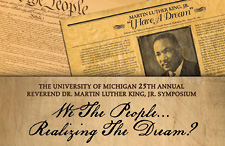
In honor of the birth of the Rev. Dr. Martin Luther King Jr., the Institute for Social Research and the Department of History are sponsoring a screening of the PBS/Nova documentary “Deadly Deception,” which tells the story of the 625 African-American men from Macon, Ala., who for four decades were unwitting participants in a government study of untreated syphilis.
The viewing is planned for 1 p.m. Jan. 17 at the Michigan Theater.
Wellesley College medical historian Susan Reverby will lead a discussion titled “Does the History of Ethical Violations Matter? What Can We Learn from Tuskegee and Guatemala?” following the screening, which is free and open to the public. A reception, also open to the public, will follow the discussion.
Reverby is the author of “Examining Tuskegee: The Infamous Syphilis Study and Its Legacy” (a 2009 book that won the 2010 Ralph Waldo Emerson Award of the Phi Beta Kappa Honor Society). She also was a member of the Legacy Committee on the Tuskegee Syphilis Study that successfully lobbied then-President Bill Clinton to offer a public apology to the surviving men.

Wellesley College medical historian Susan Reverby will discuss the ethical violations involved with the Tuskegee and Guatemala syphilis studies. Photo courtesy Susan Reverby.
In the course of researching the Tuskegee study, Reverby uncovered a second U.S. government study in Guatemala between 1946-48 in which men and women were given syphilis and then treated with penicillin, not always successfully. Reverby’s research, which will appear this month in the Journal of Policy History, prompted a joint apology this past fall from the secretaries of the U.S. Department of State and Department of Health and Human Services, and a review of human subjects protection by the President’s Bioethics Commission.

